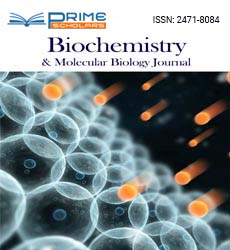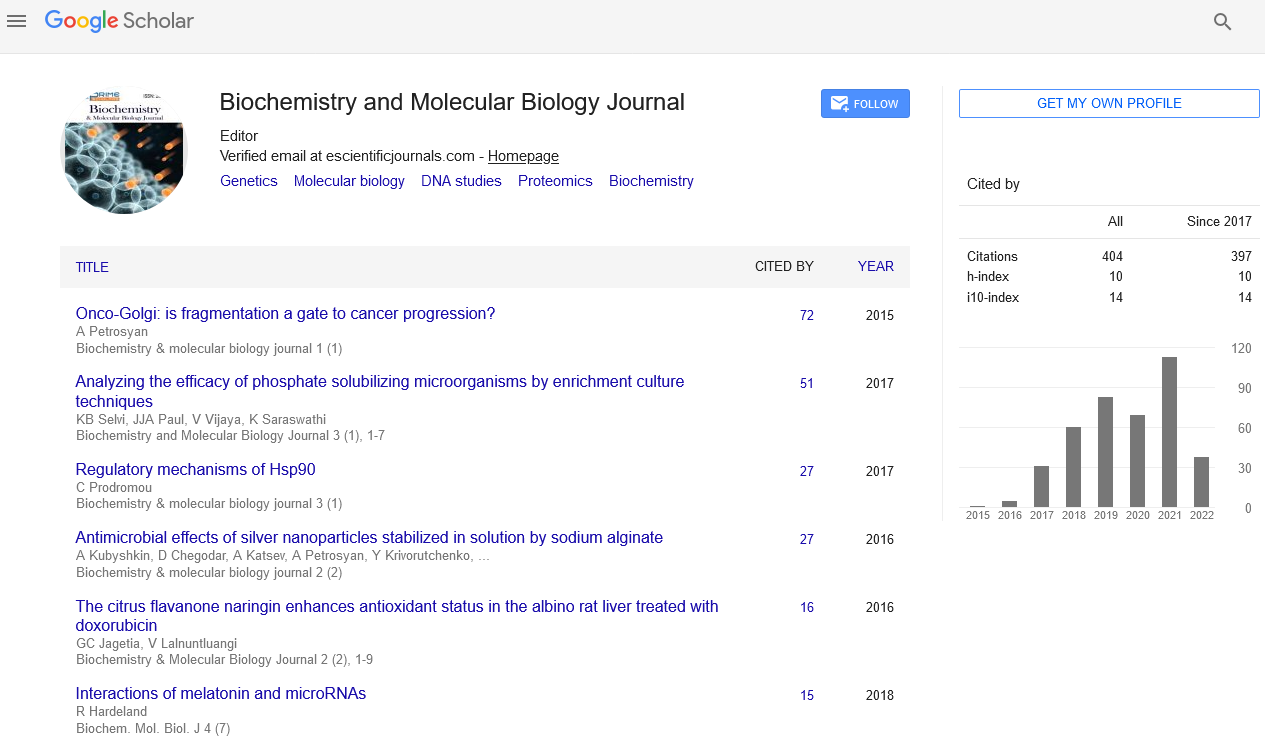Perspective - (2024) Volume 10, Issue 2
Genetic Mutations and their Role in Drug Resistance
Jane Ann*
Department of Biochemistry, Sejong University, South Korea
*Correspondence:
Jane Ann,
Department of Biochemistry, Sejong University,
South Korea,
Email:
Received: 01-Apr-2024, Manuscript No. IPBMBJ-24-20461;
Editor assigned: 03-Apr-2024, Pre QC No. IPBMBJ-24-20461 (PQ);
Reviewed: 17-Apr-2024, QC No. IPBMBJ-24-20461;
Revised: 22-Apr-2024, Manuscript No. IPBMBJ-24-20461 (R);
Published:
29-Apr-2024, DOI: 10.36648/2471-8084-10.02.14
Introduction
Drug resistance is a significant challenge in the treatment of various
diseases, particularly cancer, infectious diseases, and autoimmune
disorders. Genetic mutations are a primary mechanism by which
cells or pathogens develop resistance to therapeutic agents,
rendering treatments less effective or even completely ineffective.
Understanding how these mutations contribute to drug resistance
is crucial for developing new strategies to overcome this barrier.
This article explores the mechanisms by which genetic mutations
lead to drug resistance, their impact on different diseases, and
potential approaches to counteract resistance. Genetic mutations
can lead to drug resistance through several mechanisms, including
alteration of drug targets, activation of alternative survival
pathways, enhanced drug efflux, and inactivation of the drug.
Description
Many drugs work by binding to specific proteins or enzymes to
inhibit their function. Mutations in the genes encoding these targets
can alter the protein structure, reducing the drug’s binding affinity
and effectiveness. For example, in cancer therapy, mutations in the
BCR-ABL gene in chronic myeloid leukemia can lead to resistance
to tyrosine kinase inhibitors like imatinib. Similarly, mutations in
the EGFR gene in non-small cell lung cancer can confer resistance
to EGFR inhibitors. Cells can develop resistance by activating
alternative signaling pathways that bypass the inhibited target. For
instance, in cancer, when the PI3K/AKT/mTOR pathway is targeted
by drugs, mutations might activate compensatory pathways such
as the RAS/RAF/MEK/ERK pathway, allowing cancer cells to survive
and proliferate despite treatment. Mutations can increase the
expression or activity of efflux pumps, which actively transport
drugs out of cells, reducing their intracellular concentration
and efficacy. In cancer cells, the overexpression of ATP-binding
cassette transporters, like P-glycoprotein, is a common mechanism
of multi-drug resistance. Genetic mutations can lead to the
production of enzymes that metabolize and inactivate drugs. In
bacteria, for example, mutations can result in the production of
beta-lactamases, enzymes that degrade beta-lactam antibiotics,
rendering them ineffective. Similarly, cancer cells can express higher
levels of detoxifying enzymes that neutralize chemotherapeutic
agents. Drug resistance in cancer is a major obstacle to successful
treatment. Tumors often contain heterogeneous populations
of cells, with some harboring pre-existing or treatment-induced
mutations that confer resistance. For example, secondary
mutations in the ALK gene can cause resistance to ALK
inhibitors in ALK-positive NSCLC. These mutations necessitate
the development of next-generation inhibitors or combination
therapies to effectively target resistant cancer cells. Infections
caused by bacteria, viruses, and parasites are increasingly difficult
to treat due to drug resistance. In autoimmune diseases, genetic
mutations can influence the response to immunosuppressive
drugs. For example, polymorphisms in the TPMT gene affect
the metabolism of thiopurine drugs used in conditions like
inflammatory bowel disease and rheumatoid arthritis. Patients
with certain TPMT variants are at risk of drug toxicity and may
require dose adjustments or alternative therapies.
Addressing drug resistance requires a multifaceted approach,
including the development of new drugs, combination therapies,
and personalized medicine. Designing drugs that can target
resistant mutations or inhibit multiple pathways simultaneously is
a key strategy.
Conclusion
Genetic mutations play a critical role in the development of drug
resistance across various diseases, posing significant challenges
to effective treatment. Understanding the mechanisms by which
these mutations confer resistance is essential for developing
new therapeutic strategies. Advances in drug development,
combination therapies, personalized medicine, and resistance
monitoring offer promising approaches to overcoming drug
resistance. Continued research and innovation are crucial to staying
ahead of this evolving threat, ensuring that effective treatments
remain available for patients facing drug-resistant diseases.
Citation: Ann J (2024) Genetic Mutations and their Role in Drug Resistance. Biochem Mol Biol J. 10:14.
Copyright: © 2024 Ann J. This is an open-access article distributed under the terms of the Creative Commons Attribution License, which permits unrestricted use, distribution, and reproduction in any medium, provided the original author and source are credited.

